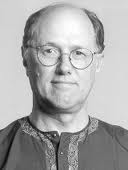Interfaith Peace-Building Growing in Muncie, Indiana by George Wolfe
 This article was published in The Star Press, Muncie, Indiana, on March 16, 2012.
This article was published in The Star Press, Muncie, Indiana, on March 16, 2012.
On Sunday evening March 4th, a remarkable interfaith event took place in Muncie at the Unitarian Universalist Church. Members of Temple Beth El and the Islamic Center of Muncie came together to sponsor an interfaith carry-in dinner. In attendance were also people from several other congregations in Muncie, including the First Presbyterian Church, Friends Memorial Church, the Unitarian Universal Church, and members of the local Hindu and Baha’i communities. Over 100 people took part. This is an encouraging sign that interfaith awareness, sensitivity and respect for the diversity of religious groups in our community are growing and becoming more established.
In 1992, after returning from my first trip to India, I got together with several people at Hazelwood Christian Church. We decided it was time to start an interfaith fellowship and the Muncie Interfaith Fellowship was born. We began holding occasional interfaith dialog meetings at the International House on the Ball State University Campus.
In September of 2001, Rev. Thomas Perchlik, who then was the minister at the Unitarian Universal Church in Muncie, approached me with the idea of increasing the fellowship’s activities. The tragic events of 9/11 made the time right for expanding our efforts. The result was monthly interfaith dialog meetings, fund-raising in support for the food pantry held at the Friends Memorial Church in downtown Muncie, and occasional community interfaith carry-in dinners. This past September, the fellowship sponsored an interfaith dinner that featured Rev. Nathan Wilson from Shelbyville speaking on “Welcoming the Stranger in a Time of Immigration Reform.”
In 2006, the Muncie Interfaith Fellowship became a cooperation circle in the United Religions Initiative, an international organization dedicated to promoting interfaith understanding. In addition, Thomas Perchlik and I created an interfaith radio show, funded by Muncie’s Unitarian Universalist Church, which ran for two years on station WERK.
About four years ago, Bibi Bahrami and Anne Eliades were inspired to bring together people from Temple Beth El and the Muncie Islamic Center. They began holding annual interfaith dinners, with the one on March 4th being the fourth such event. Most recently, a local Muncie chapter of a statewide organization known as Hoosier Interfaith Power and Light was formed to focus on environmental issues and explore a faith response to climate change.
This relatively sudden growth in interfaith interest recognizes the common values, concerns and underlying beliefs our religions share. Each of the great religions, for example, embrace some form of the Golden Rule; each associate light with God, divinity or wisdom. Each emphasizes forgiveness and has some form of penitential season; each encourages a form of reflective prayer or meditation, and each calls upon its followers to share their wealth to help people in need.
Together, we must recognize that religious tolerance in our community is not enough. For when tolerance breaks down we are left only with intolerance. We must move beyond tolerance into the realm of appreciation. For each of the world’s religions have contributed to what I call “the collective wisdom of humanity,” and it is our duty as citizens in an increasingly pluralistic society to appreciate the contribution each religion has made to this collective wisdom. While we have our differences, there is more that unites us than divides us.
Religion has been the source of much conflict in the world. At the same time, inclusive visionary leaders representing the great religions have worked together to promote nonviolence, expose injustice, and provide humanitarian relief around the world and in our community. Successful interfaith peace-building events such as this recent gathering at the Unitarian Universalist church are a welcome sign of growing spiritual health in the Muncie community.
George Wolfe is the Coordinator of Outreach Programs for the Ball State University Center for Peace and Conflict Studies. He is also a trained mediator and the author of The Spiritual Power of Nonviolence: Interfaith Understanding for a Future Without War.


